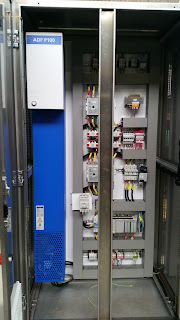Namibia in southwest Africa has 3,700 square miles of diamond
concession at sea, which is expected to yield millions of carats of marine
gemstones for the next five decades. To ensure the vessels carrying out this
mining are equipped, supply,
installation and repair specialist, CP Automation,
helped mitigate harmful harmonics on onboard the prestigious Debmar Pacific diamond
mining vessel.
Land-based
diamonds in Namibia are expected to run out with the next decade. To avoid a
shortage, the government of Namibia has been strengthening its offshore diamond
mining capacity. In a joint venture between the Namibian government and De
Beers Group, Debmarine Namibia, the country’s leading marine diamond mining
company, was established in 2002.
The company operates
five diamond mining vessels including the Debmar Pacific, which mines diamonds from
the ocean floor using advanced drill technology.
Having been built
in 1977, the Debmar Pacific was in urgent need of electrical system upgrading. Debmarine
Namibia was having problems with a particular lighting circuit, in which several
transformers were blowing due to suspected poor power quality supply. This is a
classic symptom of an electrical circuit experiencing harmonic noise related
problems.
Actom Energy, electrical
engineering specialist in South Africa, was chosen to design, manufacture and
install an active harmonic filter control panel to the vessel to alleviate this
problem.
Actom needed to
source a harmonic filter fast, and based on a recommendation from De Beers,
called upon supply, installation and repair
specialist, CP Automation. Using
the information supplied by Actom and Deers, CP Automation advised the use of an
ADF P100 active dynamic
filter by Comsys.
Why are harmonics a problem?
This problem generally
arises from the use of variable frequency drives (VFDs) and other non-linear
loads. A load is considered non-linear if its impedance changes with the
applied voltage. This change means the current drawn by the non-linear load
will not be sinusoidal, even when it is connected to a sinusoidal voltage.
Non-sinusoidal
loads contain harmonic currents that interact with the impedance of the power
distribution system to create voltage distortion and power quality problems, which
heat the transformer. This explains why
the previous transformers broke in the lighting circuit on the Debmar Pacific.
Harmonic filters
— as the name suggests — remove harmonics. However, they also correct the phase
of the fundamental currents, converting non-linear loads into linear ones. They
cancel out the noise and keep the transformers cool and working efficiently.
"We can’t stress enough how much of a
positive impact the right harmonic filter can have on a company’s environmental
performance, lowering energy consumption and improving productivity,” explained
John Mitchell, business development manager at CP Automation. "With this
in mind, we were confident the ADF P100 was a perfect match for Actom's project,
and that it would put an end to the previous transformer issues."
The ADF P100 active dynamic filter also
brings the added benefits of a high-power density while being relatively small
in size, which makes it ideal for small and medium size applications where
space is precious, such as onboard a mining vessel.
"We would certainly buy from CP
Automation again," said Gregory Webb, instrumentation technician at Actom
Energy. "Installing this filter was straight forward and engineer-friendly.
It has continued to perform well since installation, as demonstrated by the
lack of issues with the transformers in the lighting circuit, as we had seen
before commissioning the harmonic filtering."
The Debmar Pacific continues its operation
off the southern coast of Namibia. To add to this fleet, the De Beers Group has
since confirmed that the construction of the world's largest diamond mining
vessel has commenced and will begin operation in 2021.
This new vessel, along with the current
Debmar fleet vessels, will make accessing the millions of carats of marine
gemstones possible, with expert harmonic filtering onboard to ensure electrical
systems are safe, trouble-free and long lasting.
Namibia’s
land-based diamond excavation may be reaching its end, but now, the country is
taking diamond exploration offshore. With these vessels, the country can
continue reaping the rewards of its lucrative diamond mining industry, without
the limits of the land — or disruptive harmonics.



